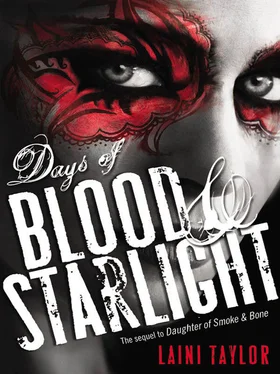When Akiva awoke, Liraz was sleeping by his side and they were in darkness, though, of course, it is never true darkness where seraphim are. Their wings, even burning dull in exhausted sleep, cast a sly luminescence that reached to the high timbered ceiling over their heads, the sloping mud walls at their sides. It was a large space, and windowless; he couldn’t tell if it was night or day. How long had he slept?
He felt… well, invigorated was a hard word under the circumstances, it sounded full of life, and he was not that, but he was a good deal better. He pushed himself up to sit.
The first thing he saw was his brother. Hazael lay on Liraz’s other side; her body was curved toward his, and for a wild instant, hope leapt in Akiva that it was three of them again, that Karou had resurrected his brother, after all, and Hazael would sit up and start telling ridiculous stories about all he had seen and done while he was a disembodied soul. But that hope quickly went the way of most hopes: Acid bitterness devoured it, and Akiva felt like a fool. Of course, Hazael was dead, still and forever. There were beginning to be flies, and that couldn’t stand.
He woke Liraz. It was time to honor their brother.
The ceremony wasn’t much as ceremonies go, but then they never were: a soldier’s funeral, the corpse its own pyre. The official words were impersonal, so they changed them to fit Hazael.
“He was always hungry,” said Liraz, “and he fell asleep sometimes on the watch. He saved himself a thousand times from discipline with his smile.”
“He could make anyone talk to him,” said Akiva. “No secret was safe from him.”
“Except yours,” murmured Liraz, and it stung, the truth of it.
“He should have had a true life,” he said. “He would have filled it up. He would have tried everything.” He would have married, he thought. He could have had children. Akiva could almost see him—the Hazael that might have been, had the world been better.
“No one has ever laughed more truly,” said Liraz. “He made laughing seem easy.”
And laughing should be easy, Akiva thought, but it wasn’t. Look at the pair of them, black hands and splintered souls. He reached for his sister’s hand, and she took it and gripped it as tightly as a sword hilt, as if her life depended on it. It hurt, but it was a pain he could easily bear.
Liraz was altered. Layers were stripped away—all her harshness and the tough veneer that even he had scarcely seen through since they were children. Hugging her knees, with her shoulders hunched and her firelit face soft with sadness, she looked vulnerable. Young. She looked almost like a different person.
“He died defending me,” she said. “If I had gone with Jael, he would still be alive.”
“No. He would have hanged,” Akiva told her. “You would still have been taken, and he would have died in misery for failing you. He would have chosen this.”
“But if he had lived just a little longer, he could have gotten away with us.” She had been staring into the flames that consumed their brother, but she blinked away from them to fix on Akiva. “Akiva. What did you do?” She did not ask, “And why didn’t you do it in time ?” but the ghost question hung there anyway.
“I don’t know,” he said, to the asked question and the unasked, and he stared into the cremation fire as it burned fast and infernal, leaving only ash for an urn they didn’t have.
What did he have in him, to have done such a thing, and why hadn’t it shown itself when he needed it most—not just in time to save Hazael’s life, but years ago, to save Madrigal’s? Had the years of devotion to sirithar honed his sympathy for magic? Or was it triggered by that sudden surge of memories of his mother?
Liraz asked, “Do you think Jael is alive?”
Akiva didn’t know what to say to that, either. He didn’t want to think about Jael, but it couldn’t very well be avoided. “He may be,” he allowed. “And if he is…”
“I hope he is.”
Akiva looked at his sister. The tough veneer had not returned. She still seemed vulnerable and young. She had spoken simply, quietly, and Akiva understood. A part of him hoped it, too. Jael deserved no such easy death as the explosion would have dealt him. But if he was alive, there were things to be done.
He rose and looked around. Mud walls, wooden door, no guards with outstretched hamsas to keep them weak; this dark place couldn’t hold them. Where was the Wolf, and why had he allowed his prisoners to rest and regain their strength?
And where was Karou? With Thiago? The idea brought gut pain, like a stab. Akiva couldn’t shake the memory of the look that had passed between them. That one look made him question everything he’d thought he knew about Karou. “I think it’s time to be going.” He held his hand out to his sister.
Once, Liraz would have rolled her eyes and risen without help. Now, she let him pull her to her feet. But once she had risen, she stood rooted beside the remains of Hazael’s pyre, staring at it. “I feel like we’re leaving him here.”
“I know,” said Akiva. To have flown so far bearing his weight, and to leave now with nothing? It seemed, in that moment, unthinkable. He looked around again, saw a jug inside the door.
“Water,” Liraz told him. “The Naja woman left it.” Akiva went and got it, offered it to Liraz, and then drank deeply himself. It was sweet and good and much needed, and when it was gone, he carefully filled the jug with Hazael’s ashes. Maybe it was foolish or morbid to keep such physical residue, but it helped, somehow.
“Okay,” he said.
“To the caves? The others must be thinking we died in the blast.”
The Kirin caves, where once upon a time he and Madrigal were to have met to begin their revolution. It was his Misbegotten brothers and sisters who awaited him there now, and with them a future that did not yet feel real. His sense of purpose was intact: to finish what he had started, end the killing, create—somehow—a new way of living. But without Karou by his side, the dream lay ahead of him with all the magic of a dusty path to a flat horizon.
“Yes,” he said. “But there’s something we have to do first.”
Liraz let out a long breath. “Please tell me it doesn’t involve saying good-bye.”
Good-bye. The word hurt. Good-bye was the last thing Akiva ever wanted to tell Karou. He thought of their first night together, how at the Warlord’s ball and later at the temple they had whispered “hello” to each other, again and again like a shared secret. It had been on his lips the first time he kissed her. That was what he would say to her if he could have what he wanted. Hello. “No,” he told Liraz, and reminded her it was bad luck to say good-bye.
To which she replied, deadpan, “Bad luck? By all means, let’s not start having any of that.”
***
It was neither “hello” nor “good-bye” that Akiva interrupted his escape to say, stealing glamoured again into Karou’s room to take her and Issa by surprise.
The Wolf, bless the godstars, was not there, but when Karou shot to her feet she threw a quick, uncertain look to the door and it was another gut-stab to Akiva—a reminder that Thiago was near, and had full access to that door.
“What are you doing here?” Karou asked, startled. Her peacock-blue hair was braided over one shoulder, and sleeves now hid the bruises on her arms. The swelling of her cheek had come down some, and her anger seemed to have gone, too. A flush spread up her neck, sudden color overtaking her pallor. “You were supposed to go.”
Supposed to go. This wasn’t the surprise it might have been. Their imprisonment had been a sham. When Akiva had laid his hand to the door to burn it, it had sighed open. It wasn’t even locked. He’d let out a small breath of a laugh and peered through the crack to see an ugly little courtyard piled with rubble, and no guards.
Читать дальше







![Лэйни Тейлор - Дочь дыма и костей [litres]](/books/415688/lejni-tejlor-doch-dyma-i-kostej-litres-thumb.webp)
![Лэйни Тейлор - Муза ночных кошмаров [litres]](/books/418520/lejni-tejlor-muza-nochnyh-koshmarov-litres-thumb.webp)
![Лэйни Тейлор - Мечтатель Стрэндж [litres]](/books/429127/lejni-tejlor-mechtatel-strendzh-litres-thumb.webp)


